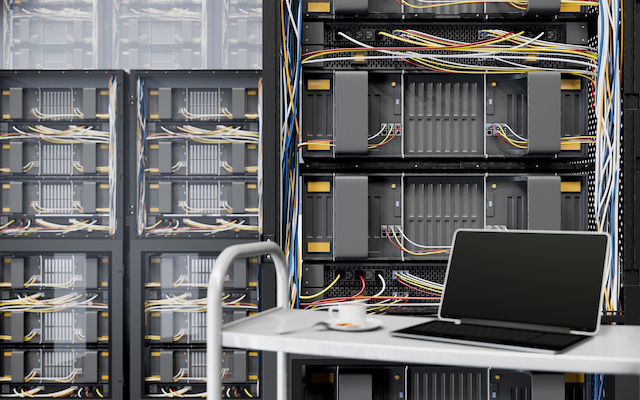
Using an improper fire extinguisher on an electrical fire like this could be ineffective and harmful to your equipment.
Picture this: you’re having a normal day at work when the smell hits you – that odd, burning, electrical smell. You look around and notice that a server is smoking and starting to catch fire. Before you reach for your fire extinguisher on the wall, do you know if it’s the right kind for the fire? Using an improper fire extinguisher on an electrical fire like this could be ineffective and harmful to your equipment. When it comes to protecting your office and property from a fire, it is essential to understand the different classes of fire extinguishers required. Here are some of the right kinds of fire extinguishers to use around servers and computers.
Why Fire Extinguisher Type is Important
Many individuals know where inside their homes or buildings their fire extinguisher is located, but few realize that they are categorized according to the kinds of fires they can help fight. Using the wrong kind of fire extinguisher for a fire could result in ineffective fire suppression, property damage, or even harm to your employees. Electrical fires involving computers and other sensitive electronic equipment can be very tricky. Class C fires are typically the kind of fire involved with computer equipment, and certain extinguishers, like water extinguishers, will not work at all and could make the situation more dangerous.
Class C Agent Fire Extinguishers
Clean agent fire extinguishers are used for Class C fires. Some of the best include:
Halocarbon-Based Fire Extinguisher
These are usually the ideal choice for server rooms with sensitive equipment. While these kinds of extinguishers can be used for both Class C and C, they’re perfect for use on electronic equipment because they don’t leave a residue that could hurt the electric components. Some common halocarbon-based extinguishing agents you could find in fire extinguishers are FE-36 (CleanGuard) and HCFC (Halotron I). HCFC is a hydrochlorofluorocarbon agent that leaves no residue and is environmentally safe. FE-36 is a hydrofluorocarbon agent that is similar to HCHFC-123 but with no ozone depletion potential.
Halon 1211 Fire Extinguishers
Halon 1211 is a type of chlorofluorocarbon, liquefied gas that is no longer produced but still recycled for fire extinguishing purposes. Halon 1211 extinguishers are still used and are safe for use on electronic-based fires.
CO2 Fire Extinguishers
CO2 fire extinguishers are another reliable option for use on electrical fires involving high-value and sensitive electrical equipment. It can be used on both Class C or Class B fires, leaves no residue, is non-conductive, and is also a non-contaminant gas. The Co2 suffocates the fire, removing oxygen from the area and disrupting and extinguishing it. This kind of extinguisher is safe for your electronics.
Fire Protection Services from Fireline
Whether you need smoke detectors, fire extinguishers, or an automatic sprinkler system installed at your commercial property, Fireline has you covered. We have been protecting people and property from fire damage since 1947—and our experience shows in our excellent work! We are known for our superb customer service, our expertise, and our reliability. For more information on how we can help your residential or commercial property, visit us online or give us a call at (800) 553-3405. We are located in Baltimore, MD, with a second office in Leesburg, VA. For more fire safety tips, be sure to follow us on Facebook, Twitter, and LinkedIn.
